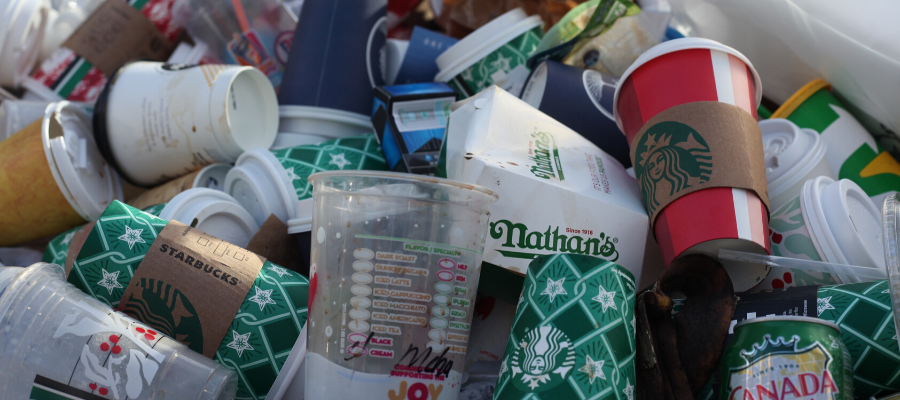The Environment and Global Justice
Sep 28, 2004Our current way of life is unsustainable. Depletion of the ozone layer, the dwindling of the rain forest, the loss of animal habi...

How much of today’s treasure is destined to be tomorrow’s trash? Are growing piles of trash the price we pay for progress? Or do our trashy habits amount to ecological terrorism?
Here’s an astounding fact: the average American produces about four and a half pounds of trash a day. That’s an astounding eight tons of trash a year! Why so much? Is this simply the price we pay for progress? What was of use or value yesterday becomes trash tomorrow. We replace the old and useless with the new and shiny. Isn’t this just civilization works?
Perhaps it not so much how civilization works, but it is how capitalism works. Certainly, our propensity to keep wanting the latest new thing is extremely wasteful and is causing major ecological problems. So why do we continue to do it? Is it just human nature to want new things, better things, more efficient things? We are an innovative species, after all. If we weren’t, we’d still be living like it was the Stone Age.
But there’s also the influence of clever advertising and marketing. Decades ago, you’d buy a product and it could last a lifetime or beyond. It could be passed down from one generation to the next. But now products are designed to break down or become obsolete every other year. Just take the iPhone. Are we really supposed to believe it took them ten tries to get the design right?
Now, I don’t want to sound like I’m against innovation. I love new and shiny things as much as the next guy. But I am against the vicious cycle of pointless consumption. Businesses create new stuff and make us want it, so we buy the new stuff. Then they create more, slightly different, new stuff. We want that too. They get rich and the Earth gets destroyed. If we continue like this, the entire planet will eventually become one giant landfill. We’ve got to find a solution!
But how do we stop the pointless consumption without destroying the economy? And how do we continue to innovate without making products that are designed to become obsolete and destined for the trash heap within a few years? Some people might be happy to hold onto their older items, but some of us will always want the latest and the fastest. Regardless of our individual dispositions, we’ve got to think about our collective impact on the plant and its fragile ecosystem.
Obviously recycling and composting are part of the solution. About one third of America’s trash is recycled. But that’s not enough, particularly if and when the rest of the planet starts consuming at the rate we do. But we can hardly deny them what we have enjoyed, especially as it is our consumption that is the source of the ecological problem we must call confront. So, we need to find a way to address global poverty without destroying the planet in the process.
When I was a kid, I loved my older brothers’ hand-me-downs. When my wife and I were grad students, we furnished our apartment with lots of cool used things we found for free. Now, I have to admit, I tend to want the latest and the fastest. But I’m willing to hand stuff down to others.
Maybe nobody wants my hand-me-downs, maybe they would consider it trash, but this is why we need a paradigm shift here. Instead of seeing old stuff as dirty, useless trash we throw away, we need to think of it as stuff you use for a while and then pass on to somebody else. So we need not just to recycle and compost, but to reuse and repurpose. Old and used doesn’t have to mean dirty trash. Perhaps what we really need is to trash the very concept of trash as we know it.
Comments (3)
Harold G. Neuman
Tuesday, November 7, 2017 -- 9:45 AM
There are numerous people whoThere are numerous people who are, in fact, trashing the concept of trash. I "reduce, reuse and re-purpose" on a regular basis and know others who do the same thing. There are many of us, but few, when compared with everyone else. This is but one aspect of a world absorbed with itself: Them that's got get; them that don't, don't. I wanted to comment on the Food Justice thing too, but there did not seem to be a comment avenue for that post. In retrospect, maybe "food insecurity" is nature's way of telling us there are too many people. If that sounds cold, consider the big picture, and/or read Sean Carroll's book by the same name. Sorry, we can't save them all. Some trash is only trash. And that is a bigger problem...
hiersd
Thursday, November 9, 2017 -- 9:46 PM
I recommend a closed-loopI recommend a closed-loop system. If you sell a car, you must accept a waste car. If you sell food, you must accept food waste. Every link of the supply chain must provide a corresponding link in the waste chain.
jakeramos
Monday, March 3, 2025 -- 11:21 PM
I think the philosophy ofI think the philosophy of trash invites us to reflect on our relationship with waste, encouraging a reevaluation of our consumption habits and ethical responsibilities toward the planet and each other. It challenges us to see beyond the surface and consider the broader implications of what we discard. Besides, sprunki phase 4 is interesting.